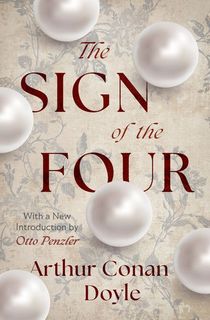Sir Arthur Conan Doyle was a master stylist who wrote across multiple genres. He penned a wide array of science fiction, fantasy, and mystery tales, interweaving humor, romance, and well-researched history throughout his work. Of course, for all the wonderful works he’s written, Sir Arthur Conan Doyle is most famous for one particular literary sleuth: private detective Sherlock Holmes.
Related: 10 Thrilling Sherlock Holmes Books
Doyle wrote four full-length Sherlock Holmes books featuring Holmes and Holmes's dear friend Dr. Watson, as well as over 50 short stories. Many consider Conan Doyle’s Holmes canon to be the absolute last word on the subject. Nevertheless, multiple authors have followed in Conan Doyle's footsteps, contributing to the author's legacy with their own Sherlock Holmes tales. And Conan Doyle’s detective certainly left a long-lasting impact on pop culture. Besides direct Sherlock Holmes adaptations like the BBC series Sherlock starring Benedict Cumberbatch, the Robert Downey Jr. led Holmes films, or the modern television adaptation Elementary, characters like Adrian Monk from the television series Monk used Holmes as a blueprint for characterization.
In fact, Sherlock Holmes has permeated pop culture so thoroughly, that we have at times lost track of where the source material ends and the derivative work begins. For example, the famous quote, “Elementary, my dear Watson,” didn’t come from any of Doyle’s canonical writings. It actually appeared for the first time in P.G. Wodehouse’s 1915 novel Psmith, Journalist. Since then, it’s regularly cited as a Sherlock Holmes quote, even appearing in Sherlock Holmes movies.
If you’re looking for true words of wisdom from Conan Doyle's famed detective, then look no further. From dramatic declarations to delightful streaks of arrogance, and even rare displays of warmth, this list of the 40 best Sherlock Holmes quotes has something for every mystery fan.
40 of the Best Sherlock Holmes Quotes
Sherlock Holmes Quotes from A Study in Scarlet

A Study in Scarlet
“To a great mind, nothing is little.” — A Study in Scarlet (1887)
This Sherlock Holmes quote hails from the pages of the novel A Study in Scarlet, which was the very first appearance of Sherlock Holmes. These words, uttered by Holmes in a moment of reflection, seem to sum up the detective perfectly: his exceedingly clever mind sees even the smallest of details through a lens of great importance.
“Let me see—what are my other shortcomings? I get in the dumps at times, and don’t open my mouth for days on end. You must not think I am sulky when I do that. Just let me alone, and I’ll soon be right. What have you to confess now? It’s just as well for two fellows to know the worst of one another before they begin to live together.” — A Study in Scarlet (1887)
This quote comes from an exchange in which Holmes and Watson trade accounts of their personal flaws to determine if they're suitable enough to live with one another in the flat at 221B Baker Street. Holmes's overly practical approach to a first meeting lays some very telling groundwork for their longlasting friendship.
“Where there is no imagination, there is no horror.” — A Study in Scarlet (1887)
This quote gets to the heart of why mysteries are so exciting—especially mysteries in novel form! Imagination knows no bounds, and when given the opportunity it will expand to fill in all the details it doesn’t know, often leaping to frightening conclusions. Lucky for Holmes, his rich imagination is tempered by his dogged pursuit of the absolute truth.
“I consider that a man’s brain originally is like a little empty attic, and you have to stock it with such furniture as you choose. A fool takes in all the lumber of every sort that he comes across, so that the knowledge which might be useful to him gets crowded out, or at best is jumbled up with a lot of other things, so that he has a difficulty in laying his hands upon it.” — A Study in Scarlet (1887)
With this quote, Holmes explains his practical approach to knowledge. He wastes no time with things like contemporary literature or—to Watson’s great surprise—the composition of the solar system. His mind is reserved solely for that which furthers his keen detective work.
“It is a mistake to confound strangeness with mystery.” — A Study in Scarlet (1887)
As Holmes belittles Inspector Gregson’s investigative methods, he simultaneously flaunts his superior train of thought. He posits that, upon coming across a piece of evidence that presents itself as unusual, Gregson, like many others, lets himself get caught up in unraveling a mystery which must be peculiar, rather than focusing on the simple facts surrounding it.
Sherlock Holmes Quotes from The Sign of the Four

The Sign of the Four
“How often have I said to you that when you have eliminated the impossible, whatever remains, however improbable, must be the truth?” — The Sign of the Four (1890)

This popular quote from the novel The Sign of the Four is the very essence of Holmes’s investigative method. Of course, this tactic only works when a detective is as clever as Holmes, as it requires the ability to clearly see all possibilities within an event. But for a genius, it’s quite simple.
“I abhor the dull routine of existence.” — The Sign of the Four (1890)
The context of this quote isn’t dull at all—in fact, Holmes is justifying his cocaine use to a greatly unimpressed Dr. Watson. This is a moment that truly fleshes Holmes out as a complex, layered, and slightly tragic character. Addicted in a way to exercising his own cleverness, he craves anything that sharpens his clarity or issues a challenge.
“I never make exceptions. An exception disproves the rule.” — The Sign of the Four (1890)
In this instance, Sherlock is referring to his distance from emotional factors when passing judgement upon another person. In general, this quote is a prime example of how rigidly he lives by self-imposed and unbendable methods—a way of life which just makes it all the more fun when, inevitably, Sherlock finds himself in a situation where he begins to bend those firm rules.
“A strange enigma is man.” — The Sign of the Four (1890)
While there is rarely a case that Sherlock Holmes can't manage to solve, people remain, to some extent, unpredictable to him. Emotions are a wildcard—but it's those human puzzles that thrill him into investigations.
“But love is an emotional thing, and whatever is emotional is opposed to that true cold reason which I place above all things.” — The Sign of the Four (1890)
Upon hearing that Watson is engaged to Mary Morstan, Holmes chooses to withhold congratulations. Though Watson is Holmes's closest friend, his devotion to logic keeps him at a certain degree of separation from the rest of mankind.
Sherlock Holmes Quotes from The Adventures of Sherlock Holmes

The Adventures of Sherlock Holmes
“It is a capital mistake to theorize before one has data. Insensibly one begins to twist facts to suit theories, instead of theories to suit facts.” — "A Scandal in Bohemia" (1891)
This quote from the short story “A Scandal in Bohemia” was published in the collection The Adventures of Sherlock Holmes. While sometimes Holmes’s steadfast application of logic can come off a bit impractical, this is one of his more sensible principles. Hope and the desire to be right can be dangerous things when assumptions come into play, and Holmes’s detached approach provides a quicker and less painful path to the truth.
“You see, but you do not observe.” — "A Scandal in Bohemia" (1891)

Holmes criticizes Watson's lack of inclination to take his investigations to the next level. The answers to life's mysteries are all around, but one has to do more than look at what's in front of them—they must deduce.
“My life is spent in one long effort to escape from the commonplaces of existence. These little problems help me to do so.” — "The Red-Headed League" (1891)
“The Red-Headed League” is another tale from Doyle’s first short story collection. This quote shows that, while Holmes is ultimately helping people with his investigations, the cases he takes on are necessary for him as well. The occupation of his brain and the sense of purpose are what keeps him going.
“Life is infinitely stranger than anything which the mind of man could invent.” — "A Case of Identity" (1891)
This line begins the short story “A Case of Identity.” It reflects upon the oddities of human nature—no doubt one of the things that draws Holmes to mysteries in the first place. While speaking to the entertainment value of mankind, it also speaks to our unpredictability.
“Never trust to general impressions, my boy, but concentrate yourself upon details.” — "A Case of Identity" (1891)
This offers another great look into Holmes’s methods, as well as his unending attempt to indoctrinate Watson to his keen ways. While Watson sometimes works off of gut feelings, Holmes discards emotional impressions to focus on the smallest of facts which build into a bigger picture.
“It has long been an axiom of mine that the little things are infinitely the most important.” — "A Case of Identity (1891)
As a woman details to Holmes how her fiancé’s focus on the smaller things spoke to his affection for her, Holmes applies these small proofs of love to a break in the case. It’s tragic, almost, that a man as obsessed with observation and small gestures has zero interest in romance.
“There is nothing more deceptive than an obvious fact.” — "The Boscombe Valley Mystery" (1891)

This provocative quote comes from the short story “The Boscombe Valley Mystery.” Upon taking on a case that seems fairly cut and dry, Holmes asserts that one should look deeper and always question everything.
“But it is better to learn wisdom late than never learn it at all.” — "The Man with the Twisted Lip" (1891)
“The Man with the Twisted Lip” offers a rare moment of humility for Holmes, as he admits to making a minor oversight in a case. It’s a classic case of learning from one’s mistakes, and Sherlock Holmes is certainly less likely than anyone else to make the same mistake twice.
"My name is Sherlock Holmes. It is my business to know what other people do not know.” — "The Adventure of the Blue Carbuncle" (1892)
Though this line comes near the end of “The Adventure of the Blue Carbuncle,” it’s certainly an inspiring introduction. It’s a straightforward summation of Holmes’s incredible talents—no matter the subject, Holmes is capable of picking up bits of information even a topical expert might overlook.
“Violence does, in truth, recoil upon the violent, and the schemer falls into the pit which he digs for another.” — "The Adventure of the Speckled Band" (1892)
Simply put, what goes around comes around. This roundabout notion of karma in the short story “The Adventures of the Speckled Band” is the very briefest of departures from Holmes’s singularly logical thought process.
“It's a wicked world, and when a clever man turns his brain to crime it is the worst of all.” — "The Adventure of the Speckled Band" (1892)
In the middle of an incredibly dangerous position amidst their investigation, Holmes laments the waste of genius on criminal acts. While often times it seems like Holmes foils crime for the satisfaction of exercising his cleverness, at the heart of it all he truly has a desire for justice.
“Crime is common. Logic is rare. Therefore it is upon the logic rather than upon the crime that you should dwell.” — "The Adventure of the Copper Beeches" (1892)
In the last story in The Adventures of Sherlock Holmes, “The Adventure of the Copper Beeches,” Holmes and Watson get into a bit of a disagreement about Watson’s record of their investigations. Holmes finds that Watson’s slightly sensationalized accounts don’t do their work justice, as the attention should be applied to the process with which the conclusion was reached, rather than the nature of the crime itself. Considering Holmes achieves feats no other investigator can even come close to, he may have a point on this matter.
Sherlock Holmes Quotes from The Memoirs of Sherlock Holmes

The Memoirs of Sherlock Holmes
“I follow my own methods, and tell as much or as little as I choose. That is the advantage of being unofficial.” — "The Adventure of Silver Blaze" (1892)
Published in The Memoirs of Sherlock Holmes, this quote comes from the short story "The Adventure of Silver Blaze." Pithy comments like this are exactly what draw readers to the flawed and dynamic character of Sherlock Holmes. He’s certainly earned his right to make his own rules.
“A man always finds it hard to realize that he may have finally lost a woman’s love, however badly he may have treated her.” — "The Adventure of the Musgrave Ritual" (1893)
In “The Adventure of the Musgrave Ritual,” as Holmes reflects on how he often puts himself in a man’s shoes to follow the sequence of a crime, he takes note of a certain kind of arrogance among men. Holmes rarely underestimates women in his investigations—a tactic which those on the other side of his deductions would be better of adhering to.
Related: The Memoirs of Sherlock Holmes
“It’s every man’s business to see justice done.” — "The Adventure of the Crooked Man" (1893)

In the short story, “The Adventures of the Crooked Man,” Holmes offers this simple moralization to a man he questions outside of a crime scene. While not precisely intended to be a call to action, it certainly makes readers want to try their hand at some Holmesian deductions.
“I cannot agree with those who rank modesty among the virtues. To the logician all things should be seen exactly as they are, and to underestimate one’s self is as much a departure from truth as to exaggerate one’s own powers.” — "The Adventure of the Greek Interpreter" (1893)
Holmes mentions his brother Mycroft to Watson for the very first time in “The Adventure of the Greek Interpreter,” stating that he finds him to be more talented at deduction than he is himself. Watson mistakes this for modesty, which Holmes is quick to correct him on. For a man as unemotional as Sherlock Holmes, this quote is oddly inspiring in one’s personal quest to put an end to belittling their own accomplishments.
“It is fortunate for this community that I am not a criminal.” — "The Adventure of the Naval Treaty" (1893)
In "The Adventure of the Naval Treaty," a fit of boredom drives Holmes to lament about the dullness of London criminals. With this quote, his arrogance once again provides a delightful pinch of comedy, making Holmes at once ridiculous and endearing.
“My horror at his crimes was lost in my admiration at his skill.” — "The Final Problem" (1893)
In the incredible short story "The Final Problem," Holmes confides in Watson about his archenemy, Professor James Moriarty. Holmes's thrill at having met an intellectual equal is set at shameful odds to Moriarty's awful deeds.
Related: The Return of Moriarty
“It is stupidity rather than courage to refuse to recognize danger when it is close upon you.” — "The Final Problem" (1893)
After Watson expresses concern over Holmes's strange behavior, Holmes admits that he's afraid. While fear is not an emotion he tends to falter under, it speaks to the grave threat that Professor Moriarty poses. This is one investigation in which Holmes won't succumb to any amount of arrogance.
Sherlock Holmes Quotes from The Hound of the Baskervilles

The Hound of the Baskervilles
“Now is the dramatic moment of fate, Watson, when you hear a step upon the stair which is walking into your life, and you know not whether for good or ill.” — The Hound of the Baskervilles (1901)
This quote from the novel The Hound of the Baskervilles inspires goosebumps. It encompasses the thrilling anticipation which makes both life and detective novels so exciting! For Holmes in this instant, the step on the stairs is a new client—Dr. James Mortimer—but letting anyone into your life is always a gamble.
Sherlock Holmes Quotes from The Return of Sherlock Holmes

The Return of Sherlock Holmes
“Work is the best antidote of sorrow, my dear Watson.” — "The Adventure of the Empty House" (1903)
"The Adventure of the Empty House" was published in the short story collection The Return of Sherlock Holmes. This tale takes place three years after the death of Sherlock Holmes, and Watson is in a state of grief as he still looks into matters of crime. However, when Sherlock turns up very much alive, the incredible detective pulls his old friend into a new and intriguing case—the perfect distraction from all of one’s woes.
“The game is afoot.” — "The Adventure of the Abbey Grange" (1904)
This notable rallying cry appears in “The Adventure of the Abbey Grange.” As Holmes drags Watson out of bed to investigate a murder, his energy speaks to the thrill he gets out of the chase.
Sherlock Holmes Quotes from The Valley of Fear

The Valley of Fear
“Mediocrity knows nothing higher than itself; but talent instantly recognizes genius.” — The Valley of Fear (1914)
This quote from the fourth and final Sherlock Holmes novel, The Valley of Fear, speaks to one of Holmes’s more endearing qualities. He doesn’t withhold credit when he feels it’s due—even though he doesn’t feel that way very often. Still, Holmes holds to the belief that the best of men know that there are even better among them.
Sherlock Holmes Quotes from His Last Bow

His Last Bow
“Education never ends, Watson. It is a series of lessons with the greatest for the last.” — "The Adventure of the Red Circle" (1911)

This quote comes from the short story “The Adventure of the Red Circle,” published in the collection His Last Bow. As Watson questions why Holmes would wade even deeper into a particular case which seemingly offers no reward, Holmes asserts that everyone—even genius detectives, apparently—benefit from continual education. This isn’t surprising, considering his deep love for information.
Related: 12 Books for Sherlock Holmes Fans
“I am somewhat exhausted; I wonder how a battery feels when it pours electricity into a non-conductor?” — "The Adventure of the Dying Detective" (1913)
In "The Adventure of the Dying Detective," Holmes is seemingly infected with a deadly tropical disease. As he spurns Watson's attempts at helping him, he likens himself to an energy source with no real outlet—a sure enough sign that Holmes's mind is in the middle of scheming against an unworthy opponent.
“I should prefer that you do not mention my name at all in connection with this case, as I choose to be only associated with those crimes which present some difficulty in their solution.” — "The Adventure of the Cardboard Box" (1893)
This delightful line comes from the short story “The Adventure of the Cardboard Box.” Holmes tosses this statement at Inspector Lestrade after providing him with the name of a suspect, delivering a pinch of comedic relief through a childlike arrogance.
“I am a brain, Watson. The rest of me is a mere appendix.” — "The Adventure of the Mazarin Stone" (1921)
“The Adventure of the Mazarin Stone” is the first short story in the collection The Case Book of Sherlock Holmes. While perhaps it’s not surprising that Holmes considers himself this way, this summation of his worth adds even more bittersweet depth to his complicated character.
“Come at once if convenient—if inconvenient come all the same.” — "The Adventure of the Creeping Man" (1923)
This hilariously assertive means of summoning Watson comes from the short story “The Adventure of the Creeping Man.” It sums up their friendship pretty perfectly, and further cements Sherlock Holmes as a character readers begrudgingly adore.
“Is not all life pathetic and futile? Is not his story a microcosm of the whole? We reach. We grasp. And what is left in our hands at the end? A shadow. Or worse than a shadow—misery.” — "The Adventure of the Retired Colourman" (1926)
This quote from “The Adventure of the Retired Colourman” isn’t the most cheerful sentiment, but it serves to reflect Sherlock’s fatigue and worry over his aging career. Plus, in addition to being an interesting look at the man behind the cold deductions, Holmes’s dramatic contemplations are always entertaining.
“Your life is not your own. Keep your hands off it.” — "The Adventure of the Veiled Lodger" (1927)
The short story “The Adventure of the Veiled Lodger” is both a peculiar and thrilling addition to the Sherlock Canon—it’s an insight into a case from Holmes’s past that he never got to solve. Upon hearing a story full of tragedy, grief, passion, and hatred, Holmes utters this quote in parting to the strange woman who summoned him. His words are uncharacteristically moving—cautioning against suicide in a way that values the contributions a person makes to others around them. Truly, this story offers one of the deepest looks into Holmes’s humanity and inner-workings that readers ever see.
Featured image from cover of "The Best of Sherlock Holmes" by Sir Arthur Conan Doyle
